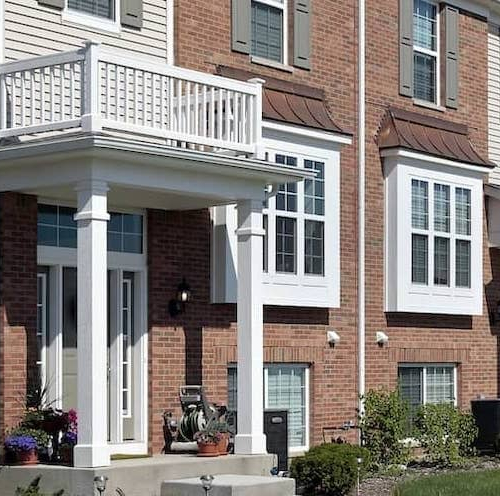Buying a house with tenants: A guide
Contributed by Sarah Henseler, Tom McLean
Apr 23, 2025
•8-minute read

There’s a lot to think about when buying a home. That’s especially true when you’re considering the purchase of a rental residence as a landlord/investor.
The good news is that owning a one- to four-unit property as opposed to a single-family home offers several benefits, including the ability to generate income every month. And if the dwelling already has one or more reliable tenants, you have the peace of mind knowing that you won’t have to look for renters.
But purchasing a house with tenants in occupancy can be tricky, too. It’s natural to have questions about this process. What are your obligations as a landlord? What legal protections do the existing tenants have? What if you want that tenant house to be your primary residence? When are you allowed to evict a renter? You can trust in this article to provide helpful answers to these and other questions.
Core takeaways:
- When you buy a home with tenants, you take on all landlord responsibilities, including following local laws, maintaining the property, and honoring existing leases.
- Tenants keep the rights granted in their lease, meaning you usually can’t evict them or change terms until the lease expires, and rent control laws may limit your ability to raise rent.
- While buying a property with tenants provides immediate rental income and saves time finding renters, it also comes with legal risks, potential eviction challenges, and restrictions on renovations.
Buying a house with tenants: What to expect
Planning to get a mortgage to buy a home currently being occupied by a renter? It’s important to know that existing tenants maintain all the rights granted to them in their current lease. Also, you’ll be taking on all of the legal responsibilities of being a landlord. But by doing your homework and knowing state and local laws, you can rest assured you’ll better understand the benefits, risks, and obligations that come with owning a rental property.
Understanding tenant rights
Truth is, tenants’ rights differ from one state to the next. The laws in some areas are more favorable to landlords, while others give tenants greater priority. Yet that doesn’t mean you should steer clear of buying in states that fit the latter description. Just be aware of what’s involved and required.
Priority No. 1? Look closely at the existing lease and understand the terms clearly. This legally binding agreement likely spells out exactly when the tenant is allowed to occupy the rental, provided they pay the rent as agreed upon. It should also indicate their rights and responsibilities.
“Tenants are entitled to the rights they have under their lease and under any state and local landlord-tenant laws. So long as a tenant under a long-term lease complies with the lease terms, generally they cannot be evicted until the lease expires,” says Elizabeth A. Whitman, real estate attorneys in Potomac, Maryland. “Even upon lease expiration, eviction protection laws may protect the tenant from eviction except for just cause – such as nonpayment of rent or breach of the lease. Rent control laws also may protect tenants by limiting how much the new owner can increase the rent.”
If the tenant is on a long-term lease, the landlord usually must comply with the rent and lease terms until that lease expires. If, instead, the tenant is on a month-to-month lease, the landlord can change the rent or lease terms with notice – usually 1 month or 30 days ahead of time.
“Likewise, the tenant isn’t required to continue their lease and can move out, leaving the landlord with a vacant property and leasing expenses,” Whitman says.
Put another way, if you buy the property the tenant may not be required to leave if you ask them to, depending on the lease’s fine print and local or state laws. Matters get a bit more complicated if you’re determined to evict, which we’ll cover later.
Landlord obligations
Owning a rental can be a profitable and feel-good endeavor. After all, you’ll be providing a valued home to a person or family. Plus, you’ll be paid well for that privilege. Still, this role comes with key duties and accountabilities that extend beyond what’s indicated in the lease paperwork. Landlords also need to:
- Follow all state and local rental laws and safety codes.
- Keep the property safe and livable for tenants.
- Ensure upkeep and operation of HVAC, electrical, and plumbing systems.
- Make sure the water heater works and tenants have running water and heat.
- Keep the property free from hazards like asbestos, lead paint, and pests.
- Maintain the building’s structure.
- Handle repairs quickly.
Your obligations don’t stop there, though. You also need to ensure the last landlord fulfilled their legal duties. Case in point: The property you inherit may not be up to current code and could require some safety modifications. The structure could need some significant updates after closing. And you also want to avoid being legally vulnerable to a lawsuit from tenants affected by a previous landlord.
Pros and cons of purchasing a house with tenants
Let’s take a closer look at the pluses and minuses of acquiring a rental property or any other home with existing tenants.
Pro: No need to find occupants
It can be challenging to find a reliable renter for a vacant home or unit. But if the property you’re eyeing already has lessees attached, you’ll save a lot of time, effort, expense, and worry.
“Finding a good tenant takes time and requires that the owner pay to market the property, screen tenants, and pay a real estate brokerage commission – expenses a new owner might not be able to afford,” says Whitman.
Even if their current lease is due to expire soon and the tenant plans to depart, you’ll hopefully have some time to prep and market the unit for new candidates.
Pro: Immediate rental income
Buying a home with existing tenants comes with another major perk: rental income you won’t have to wait for after closing. After all, if you are financing this transaction, you don’t want the property to sit vacant while you make mortgage payments.
“The biggest plus is immediate cash flow – you’ll start collecting rent from Day 1,” says personal finance expert and landlord Andrew Lokenauth. “Last September, I bought my place with tenants already in it, and my first rent check came in before I even made my first mortgage payment.”
Pro: Property up to code
Chances are, if a rental property is being listed for sale, it’s already up to snuff with state and area laws related to property codes, safety, and habitability. Still, experts strongly recommend hiring an attorney to ensure this.
Con: Inherited legal risk
On the other hand, becoming a landlord means you’re responsible for anything on or related to the property that may violate the law. That’s why it’s smart to pay for a professional home inspection. It’s equally wise to request and review the previous owner’s maintenance and repair records as well as rent payment and security deposit documents.
Con: Lease terms must be honored
Eager to buy a property with existing leases? If so, prepare to honor those lease terms.
“The new owner won’t be able to increase rents or change other lease terms until the lease expires. Rent control laws may also limit how much the landlord can raise rent,” Whitman says.
Con: Difficult to remove a tenant
Don’t like the existing renter, or want that unit for yourself? Removing that tenant won’t be easy, even if it’s allowed – which usually isn’t the case until the lease runs out.
“If the tenant doesn’t reliably pay rent or maintain the property, the owner must deal with those issues and may incur the expense and hassle of an eviction,” says Whitman. “Laws may also restrict the landlord’s ability to evict an undesired tenant.”
Con: Put renovation plans on hold
Another challenge is that you cannot renovate or make improvements while tenants occupy your property.
“I wanted to update the kitchen and one of my properties. But I had to wait 8 months until the lease ended,” Lokenauth says.
Should I buy a house with tenants?
On the fence about buying a property with renters already in place? To help make a more informed decision, carefully assess your goals for the property. For example, if you plan to occupy the home yourself, purchasing may be more of a hassle than expected. Then again, knowing you’ll have instant rental income right from the start can give you more confidence in this decision.
“I’d say do it if the tenants have a solid payment history, the rent is at market rate, and the lease terms are favorable. A property I bought in Phoenix with great tenants already in place has been my best investment,” says Lokenauth. “But I would pass if the rent is way below market rate, the tenants have a history of late payments, or the lease terms are unfavorable. Also, consider the length of the remaining lease – shorter remaining terms give you more flexibility.”
Ask Dennis Shirshikov, a professor of economics and finance at City University of New York/Queens College, and he’ll tell you that committing to a rental property with existing lessees can be a wise investment.
“But that’s true only if you do your proper due diligence, review the lease terms carefully, and are comfortable with possibly limited flexibility regarding property management,” he says.
Speaking of, if the seller currently uses a property management company, it’s smart to review the existing agreement and interview the property manager to learn if there are any issues with the property or the tenants.
Can I evict a tenant when I buy a house?
Fact is, new landlords typically have to honor the lease terms.
“Unless the lease allows it, a new landlord usually may not evict an existing tenant who isn’t in breach of their lease simply because property changed owners,” says Whitman.
One proactive strategy to consider is placing terms in your purchase contract that require the current owner to terminate the lease before the sale closes.
Some states also permit owner move-in evictions. This allows landlord owners to recover possession of a home occupied by tenants if they plan to live there but not if the property will continue to be a rental property.
Let’s say the dweller isn’t paying their rent in full, on time, or at all. Or the renter is clearly violating the terms of the lease. Experts recommend reasoning with the renter first before taking legal action. But if they won’t listen, abide by your requests, or move out when they are required to do so, you can legally pursue eviction.
“A landlord’s only option here is to file an eviction action. In most states, the eviction process takes several months and can be costly,” Whitman continues. “It is illegal for a landlord to use ‘self-help’ to remove a non-compliant tenant by changing locks or moving the tenant’s belongings out of the house.”
Lokenauth says he’s “been there, and it’s a pain.” The formal eviction process involves a court filing, waiting for a hearing date, and ideally hiring a lawyer. “In my case, it took about 3 months and cost me around $3,000 in legal fees. If you win, the sheriff’s department handles the actual removal.”
The bottom line: Know the law and the rights involved
As the new owner of a rental property, you’re entitled to a steady stream of rental income from your tenants. But you’ll also need to respect their rights, honor the language found in the lease, and ensure the property is compliant, livable, and safe. It’s best to enter this process with both eyes wide open and under the guidance of a real estate agent and attorney you can trust.
Found a property with tenants and you’d like to buy it? Make sure you have your financing in order so you can put your best foot forward. Get started online with Rocket MortgageⓇ.

Miranda Crace
Miranda Crace is a Senior Section Editor for the Rocket Companies, bringing a wealth of knowledge about mortgages, personal finance, real estate, and personal loans for over 10 years. Miranda is dedicated to advancing financial literacy and empowering individuals to achieve their financial and homeownership goals. She graduated from Wayne State University where she studied PR Writing, Film Production, and Film Editing. Her creative talents shine through her contributions to the popular video series "Home Lore" and "The Red Desk," which were nominated for the prestigious Shorty Awards. In her spare time, Miranda enjoys traveling, actively engages in the entrepreneurial community, and savors a perfectly brewed cup of coffee.
Related resources
7-minute read
Financing multiple rental properties: A beginner's guide
Looking to invest in real estate but not sure how to secure financing for multiple rental properties? Here’s everything you need to know.
Read more

7-minute read
Non-owner-occupied mortgage rates: What investors need to know
Explore non-owner-occupied mortgage rates, key requirements, and financing options for your investment property goals to determine what’s best for you.
Read more

6-minute read
Investing 101: How to buy multifamily property
Are you interested in multifamily investing? Learn about investing in multifamily real estate, loan options, and how to buy a multifamily property.
Read more